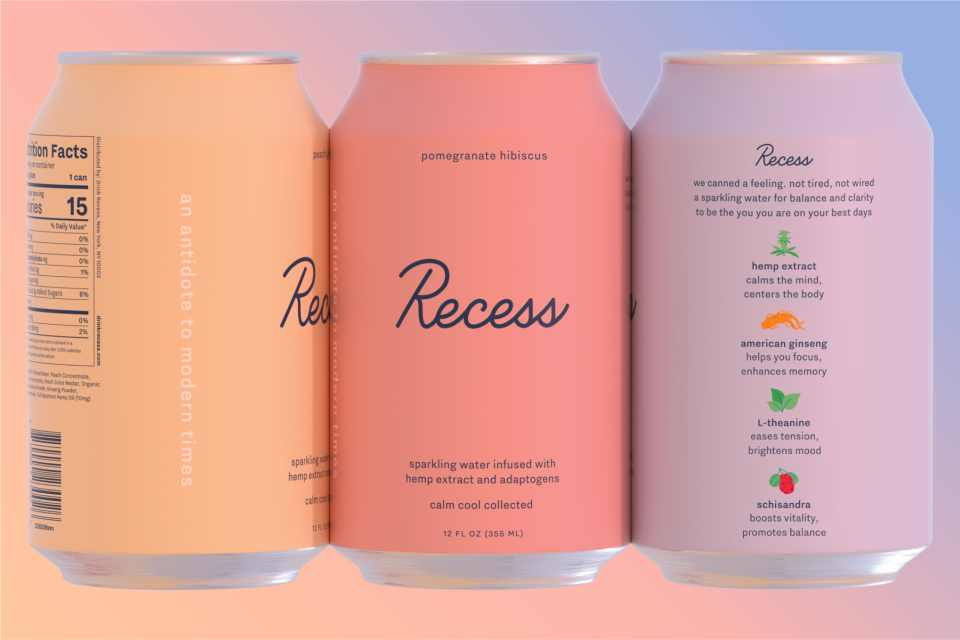CBD is ‘the caffeine of the 21st century’: Recess CEO
The key to selling a CBD product is to not sell the CBD, according to Benjamin Witte.
Witte is founder and CEO of Recess, a CBD and adaptogens-infused sparkling water brand based in New York. The one-year-old company has raised about $6 million in seed funding from as-yet undisclosed investors. Its pastel-hued 12-ounce cans are available in thousands of retail locations on the East Coast and in California.
As Witte sees it, the future of the CBD industry – and of Recess – will be about selling and marketing the feeling the component invokes, rather than the uber-trendy ingredient itself.
“The way to think about CBD is as a compound, no more interesting than caffeine or whey protein,” Witte said in an interview during Yahoo Finance’s monthly Breakouts series. “Just a commoditized functional ingredient that’s going to be added to many things.”
“I think the closest analogy to CBD is caffeine. I really believe it's kind of the caffeine of the 21st century,” Witte added. “And, you know, what are the biggest caffeine companies? It's Starbucks (SBUX), it's Red Bull, et cetera. And they don't market caffeine. They market the feeling that the compound enables, which kind of inspired our approach.”

‘Marketing a feeling’
CBD, officially known as cannabidiol, is expected to be a $16 billion market in the U.S. by 2025, according to a Cowen analysis earlier this year. CBD-infused beverages already comprise about one-fifth of the burgeoning market, although tinctures represent the most popular form for users. The substance has been touted for its potential to reduce pain and anxiety, although research to date remains inconclusive about its efficacy and proper dosing.
Looking at Recess’s sunset-colored packaging and slogans like “cool, calm, collected,” it’s clear CBD isn’t the focus. The company hardly promotes CBD at all, noting on its ingredient list it contains “10 mg of broad-spectrum hemp extract.” Witte refers to Recess as a “productivity company,” and said cans can be consumed as a less buzzy alternative to a morning cup of joe, afternoon pick-me-up or bedtime night cap.
The marketing strategy diverges from that of many of Recess’s competitors in a crowded CBD beverage space, many of which prominently promote the ingredient to capitalize on booming consumer interest in the substance. Upstarts from Mike Tyson’s The Ranch Company to public companies including New Age Beverage (NBEV) have launched CBD-infused beverages, many with similar dosages of the hemp-derived substance as Recess’ drinks.
It also underscores one potential route for steering public perception of the burgeoning industry, where a lack of clarity over the legality of the substance has capped growth and kept some retail partners on the sidelines.
While CBD is derived from cannabis, it by itself doesn’t get users high. The CBD in Recess is derived from hemp, which contains 0.3% or less of tetrahydrocannabinol (THC) and was removed from the Drug Enforcement Agency’s Schedule I classification as part of the Hemp Farm Bill in December 2018 (CBD can also be derived from marijuana, the plant that is typically more potent in psychoactive THC).
The Farm Bill moved oversight of the product to the Food and Drug Administration (FDA), which still considers CBD added to food products or marketed as a dietary supplement to be illegal at the federal level. But as Witte noted, the FDA has acknowledged the murky, asymmetrical rules governing CBD products at the state and federal levels.
“The FDA has actually kind of made statements saying ... we recognize that this is uncertain, we recognize that the entire industry needs clarity, and that we're effectively not going to enforce anyone besides the worst actors, people making claims around curing cancer and things like that,” Witte said.
To that end, “marketing a feeling” has been both a campaign strategy and, to an extent, means of keeping Recess out of the searchlight of regulators, which have clamped down on companies marketing CBD as a panacea for a host of medical ailments.
Startup beverage brand Dirty Lemon discontinued its CBD-infused beverage late last year just months after launching it, calling the endeavor “too much of a liability.” Public ventures including Curaleaf (CURLF), the most valuable U.S.-based cannabis company, have been recipients of warning letters from the FDA over making “unsubstantiated claims” that their products can treat cancer, Alzheimer’s disease, opioid withdrawal and other conditions.
Recess makes no such promises.
“We’re saying Recess is an antidote to modern times,” Witte said. “The idea is like, the world's gone crazy, and we all need a Recess.”

—
Emily McCormick is a reporter for Yahoo Finance. Follow her on Twitter: @emily_mcck
Read more from Emily:
FedEx CEO: ‘Whistling past the graveyard’ on the U.S. consumer belies a broader slowdown
There won’t be ‘billion-dollar beverage brands’ in the future: Iris Nova CEO
Iris Nova CEO calls his company the ‘Netflix’ of the beverage space
Tech companies like Lyft want your money – not ‘your opinion’
Follow Yahoo Finance on Twitter, Facebook, Instagram, Flipboard, LinkedIn, and reddit.

 Yahoo Finance
Yahoo Finance